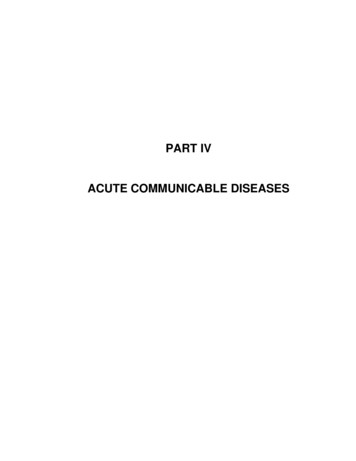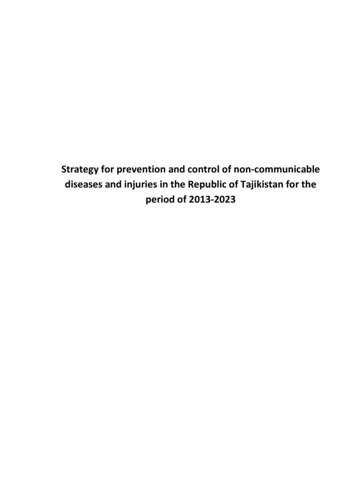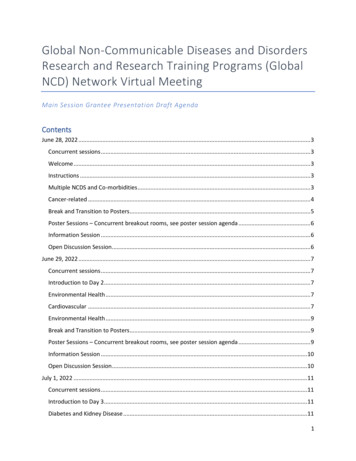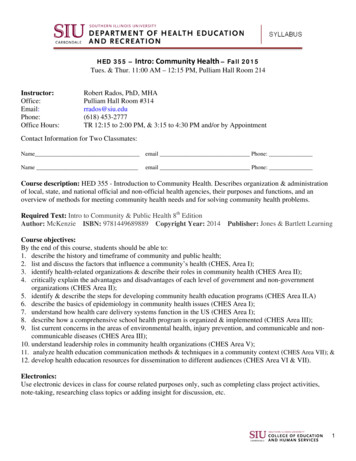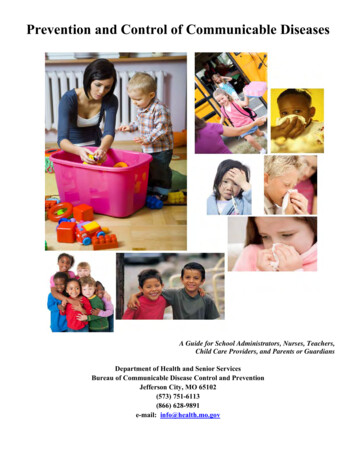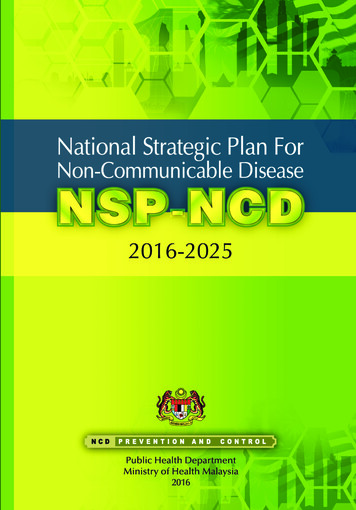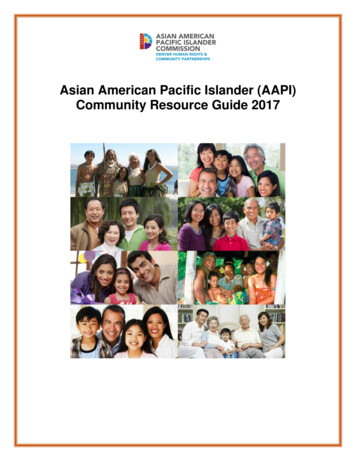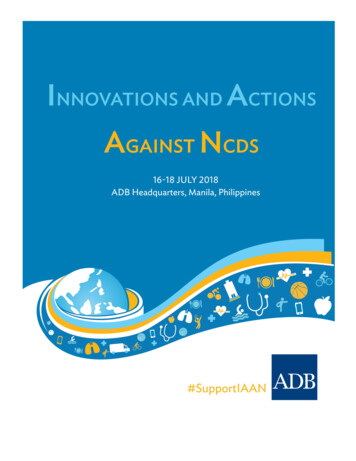
Transcription
#SupportIAAN
Background of the MeetingThe burden of non-communicable diseases (NCDs) in Asia and the Pacific continues to grow. For developingcountries, this means that increased investments in health will be required to counter the burden and associated impact such as demands on healthcare systems, lost productivity, and the resulting poverty. Governments need to invest in high-impact innovations and strategies. To support this agenda, the Asian Development Bank (ADB) is convening this conference to discuss key areas where investments in health could bemost effective.In response to the Asian Development Bank Institute (ADBI) findings of the increasing prevalence and cost ofobesity, the meeting will provide the opportunity for common member countries (CMCs) of ADB and IslamicDevelopment Bank (IDB) and other developing member countries (DMCs) of ADB to review financing needsfor the implementation of priority interventions addressing NCD programs and to identify resource mobilization opportunities, as well as next steps for joint action.PurposeFocused sessions are designed to present (i) the need for a changing paradigm for the prevention and management of NCDs, (ii) advancing data to support a system-wide response to NCDs, (iii) service deliverychallenges for NCDs, and (iv) funding innovations for NCDs. These areas are clustered to emphasize the needto balance demands for effective health service and service-delivery improvement. Considering that some ofthe most innovative developments in technology come from Asia, the conference will also provide opportunities for participants to share knowledge and exchange ideas about what works and what should be done toimprove strategies against NCDs.The meeting will also provide a platform for CMCs and DMCs that have successfully received support fromthe ADB, ADBI, and IDB to share their experiences, which will be beneficial to potential recipients.Expected Outcomes Priority interventions in national NCD control plans identified. Opportunities and best practices in seeking funding from a range of potential funding partners disseminated.#SupportIAAN
Programme at a GlanceDAY 1 (July gistrationOpening Session (Aud A–C)Plenary – Burden of Non-communicable Diseases (NCDs) in Asia and the Pacific (Aud A–C)Plenary – Best Buys for NCDs according to the Disease Control Priorities Program (DCP3) (Aud A–C)10:20–10:5010:50–11:15Tea Break and Networking OpportunityPlenary – Addressing the Gaps in Health Care Services in NCDs (Aud A–C)11:15–11:40Plenary – Urbanization and NCDs (AudiA–C)11:40–12:30Panel Discussion – Outlook of NCDs in Asia and the Pacific (Aud A–C)12:30–1:301:30–3:00Lunch (Executive Dining Room)Parallel SessionsPanel 1 – Getting the Message Across (Aud A–Panel 2 – Encouraging Physical Activity (Aud C–B)D)3:00–3:303:30–5:00Tea Break and Networking OpportunityPanel 3 – Reconfiguring How Health Facilitiesand Health Services Are Provided (Aud A–B)5:00–7:00Welcome Cocktails (Executive Dining Room)DAY 2 (July 17)9:00–10:30Panel 5 – Improving Access to Treatment (AudA–B)10:30–11:00Panel 4 – Holistic Approach to Addressing NCDPatient’s Needs (Aud C–D)Panel 6 – Food matters: Non-fiscal Policies toImprove Nutrition (Aud C–D)11:00–12:30Tea Break and Networking OpportunityPanel 7 – Put Your Money Where Your Mouth Panel 8 – Where There Is Smoke: Fiscal PoliciesIs: Fiscal Policies to Improve Nutrition (Aud A– and Cessation Interventions to Improve TobacB)co Control (Aud C–D)12:30–12:50Pitch for the Development Marketplace12:50–2.002:00–4:00Lunch (Executive Dining Room)Digital Technology and Innovations for NCD (Development Marketplace)4:00–4:30Tea Break and Networking Opportunity4:30–5:30Yoga Class6:30–8:30Health Policy Discussion – Deep-Dive into DCP3 (Dinner Hosted by IDB)(Venue to be confirmed)DAY 3 (July 18)9:00–3:00Investing in NCD BestBuys:Cancer(Aud B)3:00–3:30Investing in MentalHealth Interventions(Aud C)Double-Duty Actionsfor Healthier Dietsand Healthier People(Aud D)Trade-Health PolicyCoherence for NCDs(Annex 2)3:30–4:30Tea Break and Networking OpportunityClosing Panel: Priorities and Financing Gaps for NCDs and Call to Action (Aud A–C)4:30–5:00Closing Remarks (Aud A–C)
Session 1 – Outlook of NCDs in Asia and the PacificThe opening session focuses on presenting the current NCD burden in Asia and the Pacific. This session willprovide the common groundwork for countries to consider, given the increased burden of NCDs within countries. Invited speakers in this session will come from various backgrounds and field of expertise to make thecase for governments to take a bolder step against NCDs.Plenary SpeakersOpening RemarksBambang Susantono, PhD, Vice-President, Knowledge Management and Sustainable Development,ADBVice-President Susantono assumed the position in July 2015 and is responsible for managing ADB’sSustainable Development and Climate Change Department, Economic Research and Regional Cooperation Department, and Department of Communications. Before this, he was the Indonesia’s Vice-Ministerof Transportation and Deputy Minister for Infrastructure and Regional Development. He has chaired several research institutes and taught at universities. He was also a board member for airline, port, telecommunications and media companies. Vice-President Susantono holds a PhD in infrastructure planning andmaster’s in Transportation Engineering, and City and Regional Planning from the University of CaliforniaBerkeley.Sami Ahmad Faruqi, MSCE, Social Infrastructure Global Practice Manager, Islamic Development BankSami Ahmad Faruqi is presently heading the Social Infrastructure Global Practice, covering core businesssectors of Water Resources, Urban Development, Health and Education in the Islamic DevelopmentBank, headquartered in Jeddah, Saudi Arabia. He was previously the Division Manager for Water Resources & Environment with portfolio covering all 57 Member Countries (2015-2017). He also served asthe Division Manager for Operations Policy and as Head of Project Procurement in the Bank (2009 –2015).Working with IDB for the last 17 years, he has managed a diversified portfolio in several sectorsand regions. He has also developed and implemented Special Programs for Reconstruction in countriesaffected by natural disasters as well as for Communities in Non Member Countries. Sami Faruqi’s careerhas taken him through 30 years of study, research, project management and administration. His professional experience covers preparation of development programs, implementation of engineering projects &social sector programs, contracts and portfolio management in different positions of responsibility in bothpublic and private sectors.He holds two advanced degrees at Masters level; Civil Engineering from NEDUniversity, Pakistan and International Program Management from Leeds University, UK.Eric Domingo, MD, Undersecretary, Department of Health, PhilippinesDr. Eric Domingo is an ophthalmologist with specialization in in Ophthalmic Oncology and Pathology. In2001, he was appointed as Assistant Secretary of the Department of Health, after which he was assignedas project manager of the Sentro Oftalmologico Jose Rizal (Spanish government grant to the Philippinegovernment) from 2005-2006. From 2007-2009, he became the Deputy Director for Administration of thePhilippine General Hospital. In 2010, he became the Director of the Philippine General Hospital. Currently, he is also an associate professor at the UP College of Medicine and university researcher at the UPManila Institute of Ophthalmology.#SupportIAAN
Burden of NCDs in Asia and the PacificThaksaphon Thamarangsi, MD, Director of the Department of Non-Communicable Diseases and Environmental Health, World Health Organization Regional Office for South-East AsiaDr. Thamarangsi obtained his Doctor of Medicine and Master of Public Health from Mahidol University, Thailand, and PhD from Massey University, New Zealand. Previously, he was the director of the InternationalHealth Policy Program (2015), Health Promotion Policy Research Center (2013–2015), Center for AlcoholStudies (2009–2013), Manager for the Thai NCD Network (2013–2015) and, member of the Thailand delegation to various global health governance forums.Best Buys for NCDs according to the DCP3Dean T. Jamison, PhD, Emeritus Professor, Institute for Global Health Sciences, University of California,San FranciscoIn addition to UCSF, Prof. Jamison has been with UCLA and the University of Washington and served as T. &G. Angelopoulos Visiting Professor at the Harvard Kennedy School and the Harvard T. H. Chan School ofPublic Health (2006–2008). He previously worked at the World Bank as a research economist and as manager of the bank’s Education Policy Division and of its Health, Nutrition and Population Division. Dean was leadauthor for the Bank’s 1993 World Development Report, Investing in Health. Prof. Jamison studied at Stanford(MS Engineering Science) and at Harvard (PhD Economics, under K. J. Arrow). In 1994, he was elected tomembership in the Academy of Medicine of the US National Academies of Science, Engineering and Medicine. Prof. Jamison served as co-chair with Lawrence H. Summers of The Lancet Commission on Investing inHealth (The Lancet, December 2013). Most recently, he led work on the nine-volume Disease Control Priorities series of the World Bank and was lead author of its synthesizing publication (The Lancet, December2017).Addressing the Gaps in Health Care Services in NCDsThalia Georgiou, Managing Partner, Asia Care GroupMs. Georgiou leads Asia Care Group, a specialist firm focused on the delivery of healthcare strategy engagements across Asia-Pacific. She has 15 years’ senior healthcare management experience, and has workedacross the industry—with governments, development organizations, international nongovernment organization’s and public and private payors and providers on complex system change. Ms. Georgiou’s principal areasof focus are health reform and financing, and she has served an international clientele including advising thegovernments of the Bermuda, Canada, Hong Kong, UK, and Vietnam on health financing issues. Previously,Ms. Georgiou was the regional head of health at KPMG and led the firms’ healthcare practice out of HongKong, China. Before coming to Asia, Ms. Georgiou was the Head of Public Health for London and led theplanning of public health services in the UK capital. Ms. Georgiou has also worked extensively in NationalHealth Service Hospitals on the planning and delivery of public services.Candace Albert, Senior Managing Consultant for Healthcare, Asia Care GroupMs. Albert is a health management professional based in Hong Kong, where she serves as a senior managing consultant for Asia Care Group’s healthcare strategy engagements. With a decade of healthcare experience, Ms. Albert holds expertise in the areas of sustainable health systems, public service design, and noncommunicable diseases, through her work with a number of federal and regional government health agencies. Before joining Asia Care Group in 2017, Ms. Albert worked for the Johns Hopkins School of Medicineand later the federal government in the United States, and for OECD in Paris. At the Asia Care Group, Ms.Albert applies her knowledge of the healthcare landscape and emerging market trends everyday, to build newconsulting services and solutions targeted to the changing environment of healthcare markets in Asia and thePacific.Urbanization and NCDsPrabhat Jha, MD, DPhil, Epidemiology Professor, Dalla Lana School of Public Health, University of Toronto,CanadaProfessor Prabhat Jha is also the founding director of the Centre for Global Health Research at St. Michael’sHospital in Toronto, Canada. His research areas include epidemiology studies on the major causes of deathin developing countries, use of routine mortality data in analytic epidemiology, and tobacco control policy indeveloped and developing countries.
Panel Discussion–Outlook of NCDs in Asia and the PacificNCDs are a growing burden in Asia but there are several developments that can allow countries to be moreprogressive in ddressing this problem.ModeratorMatthias Helble, PhD, Senior Economist, Co-chair, Research Department, Asian Development Bank InstituteDr. Helble’s research interests include international trade, health, environment, and infrastructure. His latestwork has included estimating the economic costs of obesity in Asia and the Pacific, as well as fiscalmeasures to control this increasing burden. Dr. Helble began his professional career in the trade team ofthe Development Research Group of the World Bank in Washington, DC, before joining the World HealthOrganization in Geneva, Switzerland, where he was responsible for research on the intersection of tradeand health.SpeakersDudley Tarlton, Programme Specialist for Health and Development, Bureau of Policy and Programme Support, UNDPMr. Tarlton focuses on health partnerships, and covers issues including NCDs, health governance, the economic determinants of health and the sustainable development agenda. He works closely with partnerssuch as WHO, the FCTC Secretariat, and the Global Fund. He supports countries in identifying and implementing the most effective policies for preventing and controlling NCDs, and in turn expanding their economies and achieving the Sustainable Development Goals. He is currently collaborating with WHO and theFCTC secretariat on the development of investment cases on NCDs and tobacco control in 35 countries.Dudley has worked with UNDP on health and development since 2004, first at the headquarters in NewYork, then at the UNDP Russian Federation office, the Bratislava Regional Center, the UNDP Representative Office in Geneva and, now UNDP Istanbul. Before joining UNDP, he worked at the UN InternationalCriminal Tribunal for the former Yugoslavia in The Hague from 2000 to 2003.Pascale Allotey, PhD, Director, United Nations University International Institute for Global Health (UNUIIGH)Professor Allotey has a multidisciplinary background in clinical health sciences, anthropology, and epidemiology. Her community-based research has focused on equity and the health of populations marginalized bygender, ethnicity, migration status, religion, and poverty. The policy implications of this work have linkedintersecting determinants of health to health systems, human rights ,and social justice. Recently, she hasexplored implementation research in addressing solutions to diseases of poverty, NCDs and sexual andreproductive health and rights. Professor Allotey has worked across four continents to promote health andwell-being with a focus on engagement of communities. Before joining UNU, she was professor of publichealth and deputy head of the School of Medicine at Monash University (Malaysia) and founding associatedirector of the SEACO health observatory. She serves on several technical and governance bodies of international organizations and currently chairs the gender and rights panel for the Sexual and ReproductiveHealth Department of WHO. Professor Allotey currently holds an adjunct professorial appointment withMonash University Malaysia. She is widely published, having authored over 100 book chapters, commissioned reports and scientific peer-reviewed articles.Viroj Tangcharoensathien, MD, PhD Senior Advisor on Global Health, Ministry of Public Health, ThailandSecretary General, International Health Policy Program FoundationDr Tangcharoensathien received his medical degree in 1980, served for 9 years in rural district hospitals inthe northeast province of Thailand, where he received the Best Rural Doctor award in 1986 from the ThaiMedical Association under Royal Patronage. In 1990, Dr Tangcharoensathien received his PhD in healthplanning and financing from the London School of Hygiene and Tropical Medicine. He won the WoodruffMedal in 1991 for his outstanding PhD thesis, and the Edwin Chadwick Medal in 2011 for his contributionsto improving health systems in the interests of the poor. He co-founded the International Health Policy Program in 1998, an arm’s-length quasi-public agency affiliated with the ministry, to build capacity in healthpolicy and systems research, generate evidence, and influence policy in Thailand. He has published 200articles in international peer review journals since 1989.#SupportIAAN
Ammar Abdo Ahmed, MD, PhD, Senior Global Health Specialist, Islamic Development BankDr. Ahmed is in charge of health’s policy and strategy, designing and appraising cross-regional health programs and providing expertise in global health financing, partnership for health, disease control and prevention, maternal newborn and child health to IDB Member Countries. His areas of expertise include training,research and development for health. Between 2014 and mid-2018, he has also managed a health portfolioamounting to US 300 million as project team leader for health in Cameroon, Niger, Sudan, Tunisia andWestern African Health Organization. Before joining IDB in 2014, Dr. Ammar was the regional director ofthe Medicine Preventive Agency (AMP). In this role, he funded and ran the LAMIVAC, an international reference laboratory for vaccinology research and training. He has served for the Ministry of Public Health inDjibouti as director of Prevention of Prevention and Public Hygiene, director of Epidemiology and HealthInformation, founder and general director of the National Institute of Public Health of Djibouti and advisor tothe Minister of Health. He conducted regional public health strategies related to infectious diseases, HIV/AIDS, and Expanded Program of Immunization with the US-Navy Medical Research Unit-3 (NAMRU-3), theUS-Centers for Disease Control, WHO and the Center for Environmental Health Action. At the National Institute of Public Health of Djibouti, he established the Central Public Health Laboratory with the support ofNAMU-3. He has also served for the Ministry of High Education and Research as general director of theNational Institute of High Health Sciences. He teaches Public Health and Epidemiology at Djibouti's MedicalSchool. Finally, he has a record of research publications in peer-reviewers journals. Dr. Ammar holds a MDas well as a PhD in Public Health and a MPH in epidemiology from the University Pierre and Marie Curie(Paris 6) in France.#SupportIAAN
Session 2–Changing paradigm in managing NCDsMany countries in Asia and the Pacific have health systems that are ready to deal with communicable diseases but have limited capacity to respond to NCDs. Recognizing the need to change the health systems paradigm, the session will present innovations and actions that can improve country responses to the need tomanage the growing threat of NCDs.Panel 1 – Getting the Message AcrossInformation is a powerful tool to combat NCDs. Individuals must be empowered through information thatwill help them promote and sustain good health and lifestyle. This can be done through health promotionactivities involving behavioral change at various levels. With technology, information can be further harnessed in order to influence or change behavior. It can also be used to reach and urge different stakeholdersto take real and responsive actions against the disease. This session will showcase innovative health promotion activities and discuss how effective social media campaigns and digital platforms can be used to combatNCDs.ModeratorVicky C. L. Tan, Principal Director, Department of Communications, Asian Development BankAs Principal Director, of the Department of Communications, Ms. Vicky C.L. Tan is responsible for external and internal communications of the Bank. Ms. Tan was ADB’s Budget Director from 2016-2018, responsible for strategic resource planning and budget management (a position she held since June2016). Prior to this, Ms. Tan was Director, Regional Cooperation and Operations Coordination Division inthe Central and West Asia Regional Department for nearly five years. Ms. Tan joined ADB in 2000through ADB’s Private Sector Operations Department and worked both financial sector and infrastructuredivisions. She was Financial Specialist from 2004-2007 in the Southeast Asia Regional Department andled ADB’s reform programs for Lao PDR’s banking sector (both state owned commercial and ruralbanks), public financial management/supreme audit organization, among others. Ms. Tan served in theManagement Offices from 2007-2011, as Senior Advisor to the Vice President-Finance and Administration.SpeakersBeth Ann Lopez, Director of Public Affairs, mClinicaAt mClinica, Ms. Lopez built a team to launch mClinica’s mobile application SwipeRx in Vietnam, whichnow has mClinica’s fastest-growing user base. She previously led mClinica’s expansion to Cambodia.Before joining mClinica, Ms. Lopez worked in international development in Southeast Asia for 5 years.She was consultant for the impact evaluation of a 57-million USAID childhood nutrition project, wrotepolicy recommendations for the Royal Thai government to improve a migrant health insurance scheme,and served in the Peace Corps in Cambodia from 2012 to 2014. Ms. Lopez has an MPH in Health Policydegree from the Harvard T. H. Chan School of Public Health.#SupportIAAN
Joseph Holandes Ubalde, Columnist/Digital and Social Media ConsultantMr. Ubalde is a digital communications consultant and social media strategist. He was the chief consultant for new media of the Philippine government’s Presidential Communications Operations Office, wherehe co-wrote the groundbreaking Social Media Policy for Government Use. He joined the government inDecember 2016 after working for several years at the local television network TV5 as content manager ofwww.News5.com.ph.Jenny Lei Ravelo, Senior Reporter, DevexMs. Ravelo is a Devex Senior Reporter based in Manila. She covers global health, with a particular focuson the World Health Organization, and other development and humanitarian aid trends in Asia-Pacific.Before joining Devex, she wrote for ABS-CBN, one of the largest broadcasting networks in the Philippines, and was a copy editor for various international scientific journals. She received her journalism degree from the University of Santo Tomas.Sin Sovann, MD, Deputy Director, National Center for Health Promotion, Ministry of Health CambodiaDr. Sovann graduated in 1991 from the faculty of medicine, the University of Health Sciences, PhnomPenh, Cambodia. In 1999, he got his Master in Primary Health Care Management (MPHM) degree fromMahidol University, Thailand. Dr. Sovann has extensive experiences drawn from nearly 20 years of workin tobacco control program in Cambodia. In the area of mass media campaign, he has a major role inimplementing the Communication for Behavioral Impact (COMBI) program on ante-natal care, complementary feeding for child from 6–12 months, and tobacco is eating your baby alive. In the areas of research, he was a principal investigator in the conduct of 2014 opinion polls on pictorial health warning,and the results of this study leads to the development of sub-decree on 55% pictorial health warning year2015; and the Cambodia Global Youth Tobacco Surveys in 2003, 2011, and 2016, which bolstered thedevelopment of the country’s Law on Tobacco Control, and various sub-decrees. Currently, he takescharge of the tobacco control program of the Ministry of Health, and is assistant professor at the ministry’s School of Public Health.#SupportIAAN
Panel 2 – Encouraging Physical Activityco-convened with IHPPPhysical inactivity has become one of the most significant health issues of the twenty-first century. In manycountries, physical activity is disappearing from daily life. Consistent international data indicates that inactivity directly accounts for between 1 and 4 per cent of all healthcare costs. Participation in sport and active recreation can make a substantial contribution to reducing physical inactivity, preventing associated noncommunicable diseases, and improving health and well-being. The panel will throw light on frameworks likethe Kazan Action Plan and the Global Action Plan on Physical Activity (GAPPA), that enable the alignment andintegration of sport-based approaches with multi-sectoral implementation strategies that can leverage significant benefits for improved health and well-being. Insights will be shared on how sport-based approachesthrough active youth participation can be designed to be accessible and inclusive, taking into account andseeking to address wider social, economic and environmental factors that affect health and well-being. Thesession will also delve deeper into the need for governments to identify priorities for investment in sportbased infrastructure and activities that offer greatest potential impact on health and well-being.ModeratorElBashier Sallam, MD, Lead Global Management Health, Social Infrastructure Division, Economic & SocialInfrastructure Department.Dr. ElBashier joined IsDB in 2007 as Senior Health Expert and is currenly responsible for overseeing implementation of the Bank-wide Health portfolio besides advising the Management on issues related to GlobalHealth including the partnership with relevant key partners and donors. Previously, Dr. ElBashier held theposition of Manager of the Health Division at the IsDB Human Development Department where he contributed to identification of the key thematic focus for IsDB support for Health. Before joining IsDB Dr. ElBashierserved as a technical officer with WHO, UNFPA and UNICEF (1995-2006); and Director of EpidemiologyDepartment, Federal Ministry of Health (1994-1995) in Sudan. He has an extensive advisory exeprience withgovernments, UN agnecies, Civil-based Organzations (CBOs) and International Non-Govermental Organizations (INGOs) in the field of Health. Dr. ElBashier is a qualified Community Physician, Fellow of the SudanMedical Specializations Board (SMSB), holder of Master of Public Health (Mahidol University-Thailand) andDiploma of Medicine and Surgery (University of Craivoa-Romania).SpeakersShruti Mehta, Youth Project Designer, ADB Youth For AsiaMs. Mehta is the Youth Project leader as a part of Asian Development Bank (ADB) Youth for Asia initiative.Her focus lies specifically on designing meaningful and innovative components for youth engagement in theurban, water and health sectors. She has a specific interest in the role for sport and development and is amember of the Asia-Pacific Youth and Sport Task Force, led by UNESCO. Before her current role, sheworked as the Executive Assistant to the Chief executive officer of The Akanksha Foundation a non-profitorganization in Mumbai. She has degree in Banking and Insurance and has completed her Masters in International Management from the University of Bath in the United Kingdom. In the past she has taught Englishin schools in the Himalayan mountain range in India and in Turkey. She has played tennis and table competitively in the past and continues to play in her free time.#SupportIAAN
Catherine Carty, Project Manager for the UNESCO Chair,Institute of Technology TraleeMs. Carty manages the project ‘Transforming the lives of People with Disabilities their Families and Communities in Physical Education, Sport, Fitness & Recreation’ at the Institute of Technology Tralee, Ireland. Thechair works closely with UNESCO to advance the Sports Policy Follow up framework of the Kazan ActionPlan. Ms. Carty has diverse experience in the areas of inclusive physical activity, wellness, and educationthrough her policy and programme development, lecturing, and research experience. As manager of a globally focused research center, she aims to maximize the impact of diverse thinking and interdisciplinary approaches in developing practical sustainable solutions that will make the most of opportunities for well-beingfor all.Orana Chandrasiri, Researcher, IHPP, ThailandBefore her current job, Ms. Chandrasiri worked at the international relations section of the Thai Health Promotion Foundation, an autonomous state agency that funds national health promotion activities using surcharge tax revenues collected from the tobacco and alcohol industries. Her work mainly related to advancingpolicies at the national, regional, and global levels, including initiating multi-sectoral and multi-stakeholder’sjoint actions on physical activity promotion. She has just finished her secondment at the World Health Organization headquarters in Geneva involving the development of the Global Action Plan for Physical Activity. Sheis currently conducting a research project that examines the complex relationship between built environmentand physical activity. Her recent publication investigates the role of urban public parks in promoting physicalactivity and a healthy lifestyle in Thailand. She likes to run in the park, walk, and use public transportation towork, and finished her first marathon last year.Caroline Baxter Tresise, Sports specialist and Lead of Asia-Pacific Youth and Sport Task Force, UNESCOMs. Tresise is a youth and sport specialist, currently working at UNESCO Headquarters in Paris. Her areasof expertise include preventative healthcare, youth development and gender equality through sport and physical activity. An advocate for promoting physical activity as critical to the prevention of NCDs, she is dedicated to widening the evidence base for sport as a cost-effective and important intervention. While based inBangkok from 2014 - 2018, Ms. Tresise relaunched UNESCO’s sport programme in Southeast Asia and established the UNESCO Youth and Sport Task Force, a dedicated network of young leaders operationalizingsport for development at the grassroots level. She also chairs the Ethics Committee of the International Federation of Muaythai Amateur (IFMA) and a member of the Advisory Board for the International Safeguards forChildren in Sport, led by UNICEF. She holds a Mast
tion to various global health governance forums. Best Buys for NCDs according to the DCP3 Dean T. Jamison, PhD, Emeritus Professor, Institute for Global Health Sciences, University of California, San Francisco In addition to UCSF, Prof. Jamison has been with UCLA and the University of Washington and served as T. &
